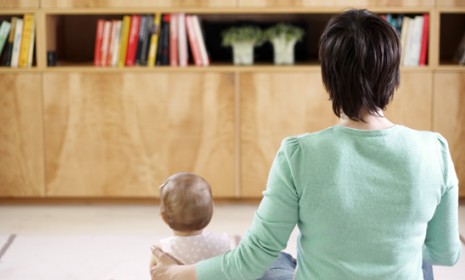Will TV 'rot your baby's brain'?
Pediatricians argue that even educational shows like Sesame Street can delay language development in kids under 2

A free daily email with the biggest news stories of the day – and the best features from TheWeek.com
You are now subscribed
Your newsletter sign-up was successful
Brace yourselves, parents. The American Academy of Pediatrics says there is no such thing as educational TV for children under 2. In fact, every minute in front of a screen can be counterproductive, the organization says, arguing that toddlers could be spending that time on activities that actually help their minds develop. Will TV really "rot your baby's brain"? Here's what you need to know:
What makes pediatricians think TV is so bad?
Since 1999, the AAP has been urging parents to avoid letting their toddlers watch videos, cautioning that there weren't yet enough studies to determine how videos affected them. That's not the case anymore, says the AAP. One recent study of 6-, 12-, and 18-month-olds found that only the oldest babies cared whether cartoons were played forward or backward, indicating that some youngsters can't even process what's on the screen, and therefore can't benefit from it the way older toddlers might. "There is a presumption by parents that TV is educational," says pediatrician Ari Brown, lead author of the new policy, as quoted by TIME. "But the research we have seen has shown there is a digital developmental divide."
The Week
Escape your echo chamber. Get the facts behind the news, plus analysis from multiple perspectives.

Sign up for The Week's Free Newsletters
From our morning news briefing to a weekly Good News Newsletter, get the best of The Week delivered directly to your inbox.
From our morning news briefing to a weekly Good News Newsletter, get the best of The Week delivered directly to your inbox.
Is that the same as saying that TV actually hurts kids?
Sort of. Watching TV can delay the development of language abilities in toddlers, the AAP says, even if they're watching shows — such as Sesame Street, Dora the Explorer, or Blues Clues — that can help older kids improve their language and social skills. The problem: When little ones are in front of the tube, they're not interacting with their parents, limiting "talk time." A study published in September's Psychological Science found that 12- to 18-month-old babies picked up more vocabulary words interacting with mom and dad than they did watching videos targeted at infants.
So is it time to ban TV for babies?
Good luck with that. Ninety percent of parents in one survey said their kids under 2 watch at least some TV. And, despite the AAP's new declaration, the research is still contradictory. While two recent studies showed that watching TV can slow language development, two others found that, while occasional TV exposure didn't help babies learn, it didn't set them back, either. As psychologist Marie Evans Schmidt tells Scientific American, "we really just don't know."
A free daily email with the biggest news stories of the day – and the best features from TheWeek.com
Sources: Houston Chronicle, NY Times, Scientific American, TIME
-
 Political cartoons for February 15
Political cartoons for February 15Cartoons Sunday's political cartoons include political ventriloquism, Europe in the middle, and more
-
 The broken water companies failing England and Wales
The broken water companies failing England and WalesExplainer With rising bills, deteriorating river health and a lack of investment, regulators face an uphill battle to stabilise the industry
-
 A thrilling foodie city in northern Japan
A thrilling foodie city in northern JapanThe Week Recommends The food scene here is ‘unspoilt’ and ‘fun’